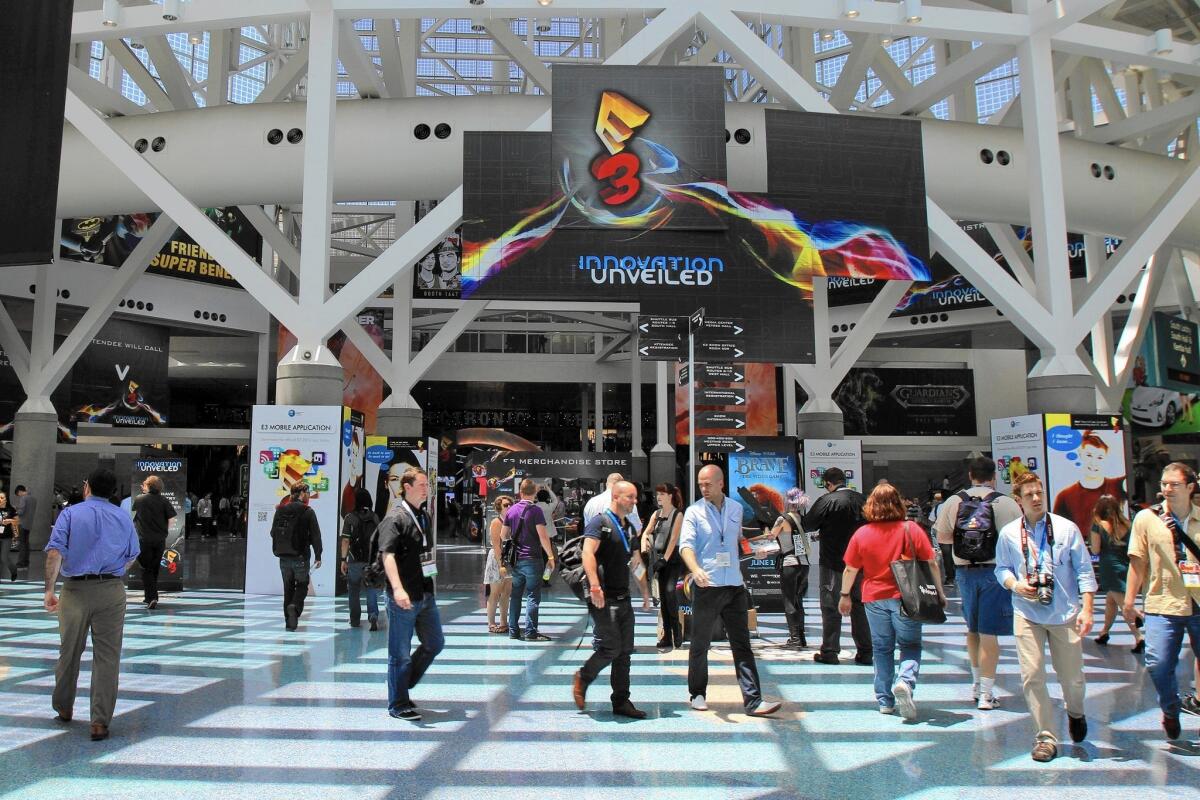City focus shifts from football to expanding L.A. Convention Center

- Share via
Now that sports and entertainment giant AEG has dropped plans to build a downtown stadium for an NFL team, tourism leaders say the city can focus on expanding and modernizing the Los Angeles Convention Center to attract bigger, more profitable gatherings.
“This is great news for us because for the last six or seven years we’ve been in this state of limbo,” Los Angeles Tourism and Convention Board chief Ernest Wooden Jr. said. “Meeting planners have been hesitant to commit to L.A.”
Wooden said he expects city officials to press ahead with plans to upgrade and expand the 870,000-square-foot facility to 1.3 million square feet, including 60,000 square feet of ballroom space.
A modernization plan should make it easier to attract large conventions, including Comic-Con International, an annual San Diego gathering of 130,000 comic book and pop culture fans, he said.
Under the NFL stadium proposal, AEG would have demolished part of the L.A. Convention Center and would have paid for a $315-million modernization and expansion of the facility.
Without the stadium, Los Angeles city officials must turn to a previously adopted backup plan for expanding the facility that may include bond funding for the project, Wooden said.
Three architectural firms have been asked to submit design proposals for that project— some with a new 1,000-room hotel next to the convention center, some without. Officials expect to select a firm to create the final designs in June, said Robert “Bud” Ovrom, executive director of the city’s Department of Convention and Tourism Development.
“We all wanted football. That was our first choice,” Ovrom said. “But the expanded convention center, I believe, will ultimately generate more jobs and more city tax revenue. It will be a bigger convention center without a football stadium.”
Wooden presented a report last month saying that Los Angeles lost out on nearly $5 billion in economic benefits over the last four years from 271 conventions that bypassed the city because the convention center was either too small or lacked enough hotel rooms within walking distance.
Los Angeles has fewer than 5,000 hotel rooms within a mile of the convention center, with an additional 2,000 or so rooms under construction. Meanwhile, Anaheim has more than 13,000 hotel rooms within a mile of its convention center, and San Diego has about 11,000 rooms within walking distance.
Los Angeles grabbed the No. 19 spot in a ranking of the nation’s most popular destinations for conventions and business gatherings released last year, below cities such as Houston, Boston and even Scottsdale, Ariz.
San Diego ranked fifth, Anaheim was 25th and Long Beach weighed in at 44th, according to a survey by Cvent, one of the nation’s largest convention management and technology firms. The annual ranking is based on bookings and requests for bookings for meeting space and hotel rooms, plus online queries for about 5,000 U.S. cities.
Business leaders say they are optimistic that downtown Los Angeles will thrive even without a football stadium.
“The good news is that downtown is hot and firing on all cylinders,” said Carol Schatz, chief executive of the Central City Assn. of Los Angeles. “We would have like to have the stadium, but this red-hot renaissance will continue nonetheless.”
In addition to upgrading the convention center, Schatz said, downtown L.A. needs more hotels built within walking distance of the center and L.A. Live, the popular entertainment center next to Staples Center. Hotel developers are ready to build around the convention center, she said, noting that AEG recently announced plans to add 755 rooms to the J.W. Marriott hotel in L.A. Live.
“Now that we have a 24-7 environment in downtown Los Angeles, that will attract conventions from all over the world,” she said.
One of the most profitable and coveted conventions in California is Comic-Con, the annual pop culture celebration that has been in San Diego for more than 40 years. Last year, its 130,000 attendees accounted for 60,960 room nights and generated $177.8 million for the local economy.
Organizers of the event are considering whether to stay in San Diego after its contract expires next year. Interest in luring Comic-Con away from San Diego has grown since plans to expand San Diego’s convention center have hit a legal hurdle.
Both Los Angeles and Anaheim officials have said they are would like to entice Comic-Con away from San Diego.
“Comic-Con is still in the process of determining its options after 2016,” said David Glanzer, spokesman for Comic-Con International. “Several factors, most importantly affordable room rates for our attendees, continue to be discussed.”
L.A.’s largest convention is the Electronic Entertainment Expo, or E3, a gathering of video game exhibitors and others that brings nearly 50,000 attendees to the convention center.
Twitter: @hugomartin
Twitter: @DavidZahniser
More to Read
Inside the business of entertainment
The Wide Shot brings you news, analysis and insights on everything from streaming wars to production — and what it all means for the future.
You may occasionally receive promotional content from the Los Angeles Times.












